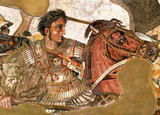
Alexander the Great�s defeat of the Persian and his conquest of the lands stretching from Macedonia and Greece to the edge of India brought a new era to Judea. He did not, however, lived long enough to enjoy or to consolidate his accomplishments. He did, however, leave behind a legacy that was to have a profound and permanent impact on the development of Judaism as well as Christianity; he made Greek (Hellenist) culture the most pervasive influence in all the places he conquered. Greek became the lingua franca of the then-known world, and many Jews began to adopt the liberal Hellenistic lifestyle for themselves.
Within 17 years of his death in 323 BC, Alexander's vast empire had been dismantled and divided among his generals. After the dust of the initial fraca had settled, Egypt went to Ptolemy, Macedonia to Antigone, and Asia to Seleucus. The year 321, when the Seleucids inaugurated their reign, became the year from which many of the inter-testamental documents, such as the books of Maccabees, date their events—"the year of the kingdom of the Greeks."
Though originally part of the Ptolemaic pie, Judea came under Seleucid control in 198 BC. To pay for their war efforts the Seleucid kings raided temples everywhere, including the one in Jerusalem, for their gold, and played the divide-and-rule game to find which princes would pay the best price to rule their own people. The Jewish commonwealth was riddled with internecine conflicts as brothers and uncles outbid one another in their bribery for Seleucid endorsement to secure for themselves the office of High Priest. The problem was compounded by the fact that the Seleucids were thorough-going Hellenist with a passion to convert the world to their Hellenist culture and religion. Alongside the in-fighting of the Jewish princes there arose the increasingly bitter division between conservative Jews and their Hellenist counterparts. A flash-point was soon in the making. The spark was finally supplied by the approval from the Seleucid king Antigonus IV Epiphanes to order the most thorough-going programs into action; in 168 BC he decreed that an altar to Zeus be erected in the Temple in Jerusalem and that Jews should be compelled on pains of death to sacrifice pigs on their altar (there is some evidence that the initiative for it may have come from a Hellenist extremist and high-priest called Menalaus, who felt that this was the only way to rid his people of the obscurantism he saw in the Mosaic laws and the Temple rituals). Thousands of Jews who refused to obey were killed.
Low Chai Hok
©Alberith, 2013